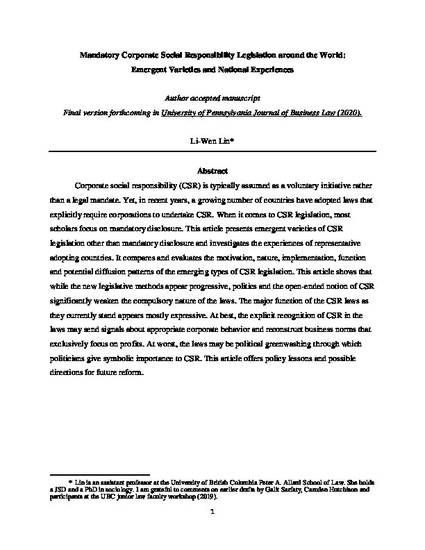
Article
Mandatory Corporate Social Responsibility Legislation around the World: Emergent Varieties and National Experiences
University of Pennsylvania Journal of Business Law
(2021)
Abstract
Corporate social responsibility (CSR) is typically assumed as a voluntary initiative rather than a legal mandate. Yet, in recent years, a growing number of countries have adopted laws that explicitly require corporations to undertake CSR. When it comes to CSR legislation, most scholars focus on mandatory disclosure. This article presents emergent varieties of CSR legislation other than mandatory disclosure and investigates the experiences of representative adopting countries. It compares and evaluates the motivation, nature, implementation, function and potential diffusion patterns of the emerging types of CSR legislation. This article shows that while the new legislative methods appear progressive, politics and the open-ended notion of CSR significantly weaken the compulsory nature of the laws. The major function of the CSR laws as they currently stand appears mostly expressive. At best, the explicit recognition of CSR in the laws may send signals about appropriate corporate behavior and reconstruct business norms that exclusively focus on profits. At worst, the laws may be political greenwashing through which politicians give symbolic importance to CSR. This article offers policy lessons and possible directions for future reform.
Keywords
- corporate social responsibility,
- corporate philanthropy,
- fiduciary duty,
- corporate goverance
Disciplines
Publication Date
Spring February 1, 2021
Citation Information
Li Wen Lin. "Mandatory Corporate Social Responsibility Legislation around the World: Emergent Varieties and National Experiences" University of Pennsylvania Journal of Business Law (2021) Available at: http://works.bepress.com/li-wen-lin/8/
